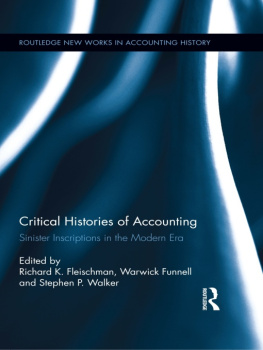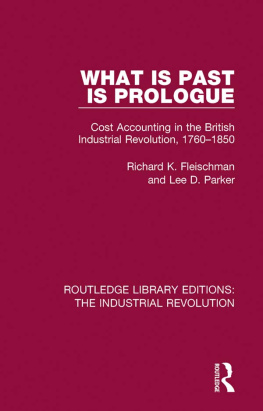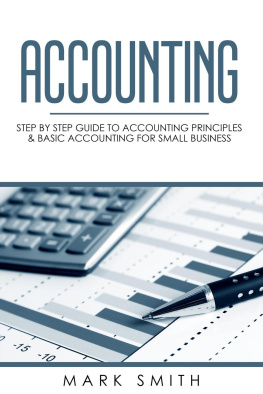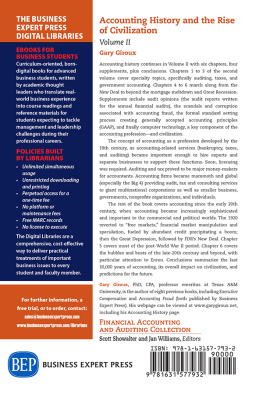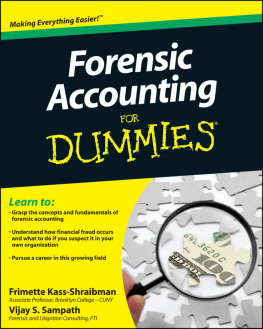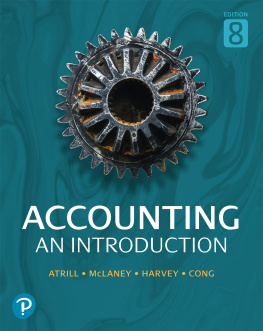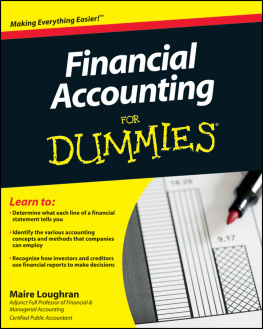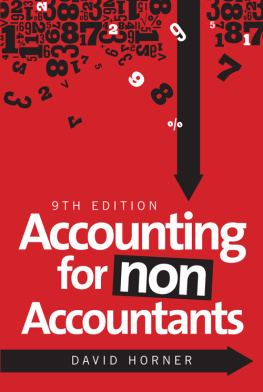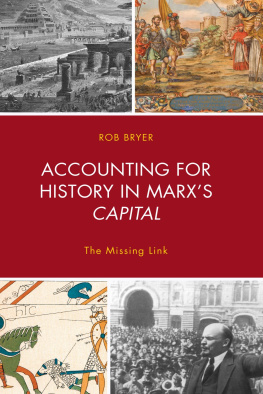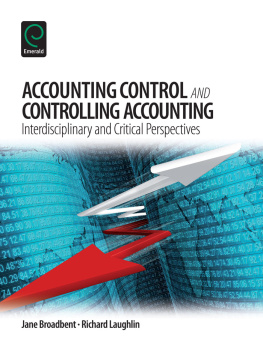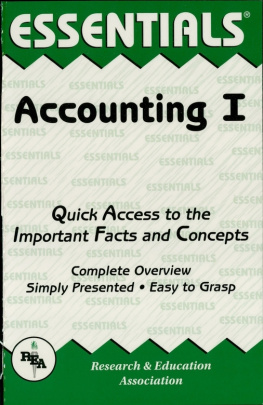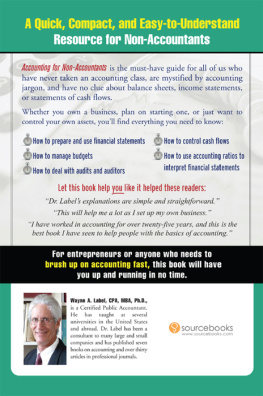Routledge New Works in Accounting History
EDITED BYGARRYCARNEGIE(Melbourne University Private, Australia),
JOHNRICHARDEDWARDS(Cardiff University, UK),
SALVADORCARMONA(Instituto de Empresa, Spain) and
DICKFLEISCHMAN(John Carroll University, USA)
| The Institute of Accounts |
| Nineteenth century origins of accounting professionalism in the United States |
| Stephen E. Loeb and Paul J. Miranti, Jr. |
| Professionalism and Accounting Rules |
| Brian P. West |
| Accounting Theory: |
| Essays by Carl Thomas Devine |
| Edited by Harvey S. Hendrickson and Paul F. Williams |
| Mark to Market Accounting |
| True North in financial reporting |
| Walter P. Schuetze, edited by Peter W. Wolnizer |
| A History of Auditing |
| The changing audit process in Britain from the nineteenth century to the present day |
| Derek Matthews |
| Contemporary Issues in Financial Reporting |
| A User-Oriented Approach |
| Paul Rosenfield |
| The Development of the American Public Accounting Profession |
| Scottish Chartered Accountants and the Early American Public Accounting Profession |
| T. A. Lee |
| Two-Hundred Years of Accounting Research |
| Richard Mattessich |
| Double Accounting for Goodwill |
| A Problem Redefined |
| Martin Bloom |
| Accountancy and Empire |
| The British Legacy of Professional Organization |
| Chris Poulloas and Suki Sian |
| Critical Histories of Accounting |
| Sinister Inscriptions in the Modern Era |
| Edited by Richard K. Fleischman, Warwick Funnell and Stephen P. Walker |
Critical Histories of Accounting
Sinister Inscriptions in the Modern Era
Edited by Richard K. Fleischman,
Warwick Funnell and and Stephen P. Walker
First published 2013
by Routledge
711 Third Avenue, New York, NY 10017
Simultaneously published in the UK
by Routledge
2 Park Square, Milton Park, Abingdon, Oxon OX14 4RN
Routledge is an imprint of the Taylor & Francis Group, an informa business
2013 Taylor & Francis
The right of Richard K. Fleischman, Warwick Funnell and Stephen P. Walker to be identified as the authors of the editorial material, and of the authors for their individual chapters, has been asserted in accordance with sections 77 and 78 of the Copyright, Designs and Patents Act 1988.
All rights reserved. No part of this book may be reprinted or reproduced or utilised in any form or by any electronic, mechanical, or other means, now known or hereafter invented, including photocopying and recording, or in any information storage or retrieval system, without permission in writing from the publishers.
Trademark Notice:Product or corporate names may be trademarks or registered trademarks, and are used only for identification and explanation without intent to infringe.
Library of Congress Cataloging-in-Publication Data
Critical histories of accounting: sinister inscriptions in the modern era /
edited by Richard K. Fleischman, Warwick Funnell, and Stephen P. Walker.
p. cm. (Routledge new works in accounting history; 11)
Includes bibliographical references and index.
1. AccountingHistory. I. Fleischman, Richard K. II. Funnell,
Warwick. III. Walker, Stephen P.
HF5605.C75 2012
657.09dc23
2012003567
ISBN ISBN13: 978-0-415-88670-3 (hbk)
ISBN ISBN13: 978-0-203-10274-9 (ebk)
Typeset in Sabon
by IBT Global.
Contents
WARWICK FUNNELL AND STEPHEN P. WALKER |
|
WARWICK FUNNELL |
|
ELLEN J. LIPPMAN AND PAULA A. WILSON |
|
CAMERON GRAHAM AND DEAN NEU |
|
STEPHEN P. WALKER |
|
PHILIP OREGAN |
|
TREVOR HOPPER |
|
DAVID OLDROYD, RICHARD K. FLEISCHMAN AND THOMAS N. TYSON |
|
KEITH HOOPER AND KATE KEARINS |
|
LINDA M. KIRKHAM AND ANNE LOFT |
|
THERESA HAMMOND AND DENISE W. STREETER |
|
MARCIA ANNISETTE |
Tables
| 4.1 |
| 4.2 |
| 10.1 |
| 12.1 |
| 12.2 |
| 12.3 |
| 12.4 |
Introduction
Warwick Funnell and and Stephen P. Walker
The critical tradition has come to occupy a prominent place in accounting historiography. Critical accounting scholars have confronted the responsibility of accounting and accountants in precipitating crises in the past and the present. They have revealed how the seemingly innocuous practice of accounting has featured in key episodes of the modern era such as acts of genocide, the operation of slavery, the treatment of indigenous peoples and the exploitation of labour under capitalism. Scholars have also shown that the organizations which represent accounting practitioners and the places in which accountants pursue their craft are locations for the practice of social exclusion on the basis of gender, class, race and ethnicity.
This book presents a collection of eleven previously published, signicant articles, authored by prominent critical accounting historians, in the hope of interesting a new generation to consider the intellectual possibilities and rewards of doing research in the area. These chapters are prefaced by an overarching and thematic review, which charts the expansion of critical accounting history research and suggests some future directions. The titles of the four parts of this bookannihilation, subjugation, exploitation and exclusionrecognize that an impressive, expanding body of historical research has shown accounting to be far more than a prosaic, neutral technical practice. Instead, accounting inscriptions can have a pronounced and powerful moral dimension as a sinister political tool used to promote the interests, ideologies and plans of individuals or groups, irrespective of any catastrophic impacts on others. There have been many recurring episodes in the past, observes Fleischman (2004, 12), where accounting or accounting practitioners stand accused of participation in repressive regimes or dishonest actions.

